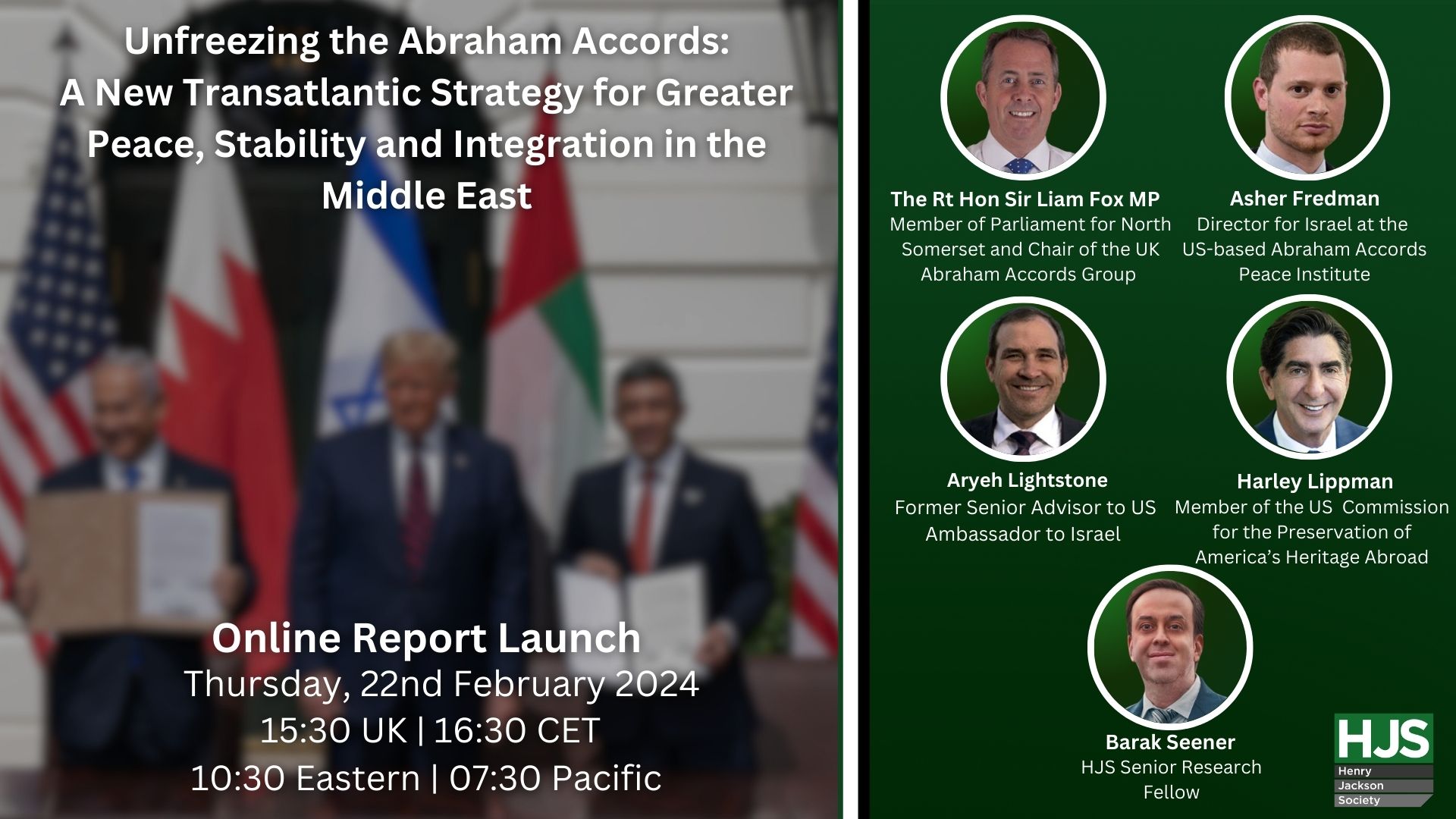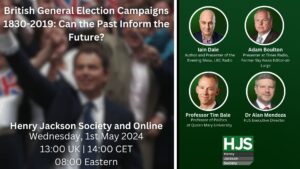Unfreezing the Abraham Accords: A New Transatlantic Strategy for Greater Peace, Stability and Integration in the Middle East

- This event has passed.
Unfreezing the Abraham Accords: A New Transatlantic Strategy for Greater Peace, Stability and Integration in the Middle East
22 February @ 3:30 pm - 4:30 pm

In the wake of the appalling terrorist attack against Israel on October 7, there were widespread concerns that the US-led plan to stabilise the region through increased ties between Israel and its Arab neighbours, known as the Abraham Accords, would be an inevitable casualty of the ensuing conflict.
Yet despite Iran’s ongoing disruption though proxies including Hamas and the Houthis, Saudi Arabia is open to normalising relations with Israel, while also advancing the prospect of a Palestinian state. Despite regional tensions, Abraham Accord ties with the signatories have continued.
Yet with Israel’s war of self-defence ongoing, the Abraham Accords remain frozen, waiting for new diplomatic efforts to revive their potential. At the same time, the new, Western-facing regional order promised by the Accords is under threat from the growing influence of China in the region. This makes the need to unfreeze the Accords, and regain the initiative, all the more important.
A new report by Barak Seener for The Henry Jackson Society argues that the UK has an important role to play in unfreezing the Abraham Accords, by leveraging its broader diplomatic ties with GCC States as well as its regional economic and security interests. By working alongside the United States, the UK can help deliver a new transatlantic strategy that integrates both trade and military power, stabilising the region and countering both Iranian and Chinese influence.

The Rt Hon Sir Liam Fox has been the Member of Parliament for North Somerset since 1992. He served as the Secretary of State for Defence between 2010 and 2011, and as the first Secretary of State for International Trade and the President of the Board of Trade between 2016 and 2019. He has been the Chair of the UK Abraham Accords Group since 2021. In 2013 he published Rising Tides, a book analysing crucial world issues alongside Tony Blair, Condoleezza Rice, Malcom Rifkind and Donald Rumsfeld. He was also the UK’s nominee to be the Director-General of the World Trade Organisation in 2020.

Asher Fredman is Director for Israel at the US-based Abraham Accords Peace Institute, and a Senior Managing Fellow at Israel’s Misgav Institute for National Security. He is the founder of the Israeli-Emirati Forum and was one of the founding members of the UAE-Israel Business Council. He formerly served in senior roles in Israel’s Strategic Affairs Ministry, Public Security Ministry and Prime Minister’s Office. He holds a BA and MA from Harvard University, and lives in Jerusalem with his family.

Aryeh Lightstone served as the Senior Advisor to U.S. Ambassador to Israel David Friedman from 2017 to 2021. During his tenure as Senior Advisor he played a critical role in advancing bilateral U.S.-Israel relations with a focus on economic development & technology cooperation. He was instrumental in facilitating the opening of the U.S. Embassy in Jerusalem as well as its successful merger with the Jerusalem Consulate. Lightstone was appointed as the Special Envoy for Economic Normalization. In that role he was an integral member of the Peace to Prosperity team, leading the inaugural Abraham Accord Business Summit, directing the Abraham Fund, and serving as point person in the Middle East for the actualization of the Abraham Accords. Lightstone received the highest honour a civilian can receive from the US Department of Defence as well as the highest honour from the US Department of State for his critical work in advancing US interests across the Middle East and forging peace in the region. Lightstone is the author of “Let My People Know” the inside story of the Abraham Accords. Aryeh is a proud father of four and husband to a very patient wife, Estee.

Harley Lippman was appointed by President George W Bush to serve as a member of the U.S. Commission for the Preservation of America’s Heritage Abroad and has been reappointed by every president since.
In 2022, Harley was appointed by the Biden administration to serve on the USAID Partnership for Peace Fund whose charter is to build economic, social, and political connections between Israelis and Palestinians. This can serve as a foundation for joint economic ventures, fostering tolerance, and ultimately coexistence.
Harley serves on the board of Advisors of Yale University’s School of Management. Harley is also a member of the Dean’s Advisory Board at Columbia University’s Graduate School of International and Public Affairs. Harley also serves on the boards of foreign policy thinktanks including the Washington Institute for Near East Policy and is a Council member of the Brookings Institution.
Harley Lippman is committed to building ties between the US, Israel, and Arab states. Harley has worked extensively behind the scenes meeting leadership across the Middle East to advance the Abraham Accords. More broadly, Harley has met with world leaders that include President Biden, Turkey President, Recep Tayyip Erdoğan, and Egypt President, Abdel Fattah el-Sisi to discuss issues of U.S. foreign policy; Israel; and ways to build better, more peaceful relationships amongst Middle Eastern nations.
Harley frequently offers commentary on breaking news to international outlets including: Sky Arabia, MSNBC, NewsMax, Fox News, Dutch, Swiss and Chinese, and Saudi TV. Harley has published on Middle Eastern dynamics in the Hill, the National Interest, and Newsweek.

Barak Seener is a Senior Research Fellow at the Henry Jackson Society and the founder of Strategic Intelligentia and the Gulf Futures Forum. Previously, Barak was a Global Intelligence Manager at HSBC and the Middle East Fellow at the Royal United Services Institute (RUSI) on whose behalf he has debriefed international defence and security policy makers and diplomats on matters relating to Middle East security. Barak has lectured at NATO as well as the Royal College for Defence Studies. He also staged the world’s first, and hugely successful conference in London at the Royal United Services Institute (RUSI) on Palestinian statehood. This examined the security Implications for the Region bringing together leading Israelis, Palestinians, US and European representatives in London 2011. Prior to joining RUSI, Barak was one of the Henry Jackson Society’s founders in Westminster and was the Henry Jackson Society’s Greater Middle East Section Director.
Barak published a book in 2018 entitled, ‘Commercial Risks Entering the Iranian Market: Why sanctions make investment in the Islamic Republic of Iran a high-risk proposition.’
Barak has published and provided analysis and expert commentary for a range of international broadcasters including Al-Jazeera, BBC, CNN, Chinese CCTV, Fox News, Sky News, Voice of America, and news outlets such as Bloomberg, Reuters, Associated Press, the Evening Standard, Jerusalem Post and Xinhua.
Barak has published in publications including Newsweek, the National Interest, the American Interest, Jane’s Intelligence Review and Jane’s Islamic Affairs Analyst on counter-terrorism, US-China dynamics, risks to supply chains, globalization and the end of the liberal international order, transatlantic relations, universal jurisdiction, nuclear proliferation and Middle East issues including the Arab Spring, tensions in Libya, Egypt and Syria, strategic and security dynamic between Iran and the Gulf, and the Palestinian-Israeli conflict.
***
EVENTS SUMMARY
The Henry Jackson Society was honored to host the report launch event featuring the Rt Hon Sir Liam Fox MP, Asher Fredman, Aryeh Lightstone, Harley Lippman, with Barak Seener moderating. Seener emphasized the strategic significance of the Abraham Accords in fostering peace and stability in the Middle East, while Sir Liam Fox highlighted the potential for economic cooperation and the need for increased military interoperability. Harley Lippman discussed Saudi Arabia’s role in regional normalization, addressing challenges posed by the conflict in Gaza, and Aryeh Lightstone emphasized the imperative of sustained Western support to maximize the Accords’ transformative potential amidst evolving geopolitical dynamics. Fredman emphasized the significance of the Abraham Accords, stressing its multilateral future involving Western and Eastern partners. Additionally, the discussion touched upon concerns about the trajectory of the Abraham Accords in light of regional dynamics and challenges, emphasizing the importance of addressing issues such as Palestinian rejection of Hamas and ensuring consistency in U.S. engagement. The potential role of private funding and the need for political support to advance the Abraham Accords agenda was also discussed.
This event can only be watched ONLINE. Follow the link to register your attendance.
RELATED EVENTS
British General Election Campaigns 1830-2019: Can The Past Inform The Future?”
The British general election is the linchpin of our liberal democracy, and its results are often fundamental to how we live. With the next UK general election looming, there is therefore … Continued



